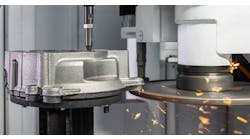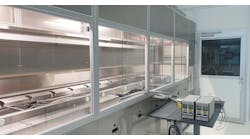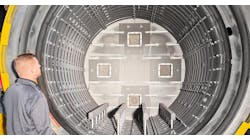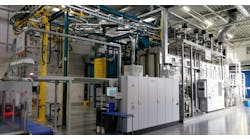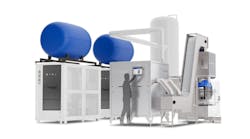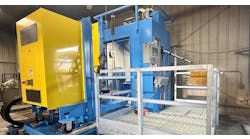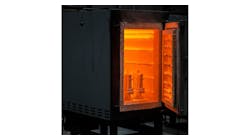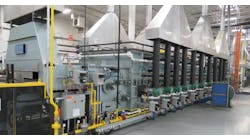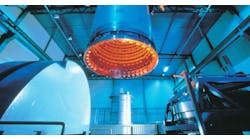Manufacturing activities are being shaped to an increasing degree by the particular demands of consumer taste. In automotive production, specifically, consumers’ expectations of finished product quality and performance defines product design with greater attention to the details of material selection and manufacturing process control, which further determines the requirements of the supply chain.
For example, as consumer expectations have become increasingly sophisticated, luxury automotive manufacturers have pushed the envelope on what is possible in their vehicle designs. Include the influence of government regulations for emissions control, which have become even more stringent, and the automotive sector is a challenging, increasingly competitive landscape for suppliers. It should be noted, too, that it’s a landscape that rewards suppliers who identify appropriate opportunities to adapt to the changing circumstances.
One useful, current example of this is a new seven-speed transmission. The focus of its development was to increase performance efficiency, as well as to reduce vehicle fuel consumption and CO2 emissions. While this transmission has significant benefits, the aluminum alloy selected for the product is a challenge in the casting and molding stage, because of the tendency for material porosity to result during solidification: porosity in the transmission system could lead to failure in performance.
Under pressure to deliver
When the transmission case program was launched, the automotive manufacturer required 100% of the parts to be sealed by a vacuum impregnation sequence. If the porosity is not sealed in such a design, fluids or gases may leach from the part under pressure during vehicle operation. Parts that exhibit fluid or gas leakage would be rejected, increasing manufacturing costs and causing production delays.
Cleanliness standards require that no sealant is used on the part surface or machine features. This is very difficult to achieve because the transmission case has over 1,500 machined features. The automotive OEM needed a design and process solution for the transmission cases, one that would meet the quality and cleanliness requirements, and also fulfill its global production goals.
The program was launched with a vertically integrated, Tier One European supplier that pours the castings, machines the finished parts, and then sends the components to the OEM for assembly. Previously, similar programs had been outsourced to local vacuum impregnation service vendors, but the new program could not be outsourced due to two additional challenges that impregnation services could not address:
Logistics. Outsourcing vacuum impregnation was determined to be not viable because it would cause difficulties with transportation costs and part handling. The volume of parts being passed between the foundry and impregnation vendor would inhibit smooth production flow.
Part Contamination. The OEM’s previous impregnation service provider used a standard, vacuum batch system. A common problem with batch systems is part contamination. Also, after impregnation was complete the sealant remained on the surface and machined features.
To the OEM and Tier One supplier, the previously used sealing technology limited what was possible in vacuum impregnation, and a better approach to impregnation was needed prior to the launch of high-volume production for the seven-speed transmission case.
Reliable sealing
The Tier One supplier approached Godfrey & Wing and presented its vision for a reliable, high-throughput impregnation process, and the developer responded with the Continuous Advanced Powertrain Impregnation (CAPi) System.
The custom-designed CAPi system based on Godfrey & Wing’s Advanced Powertrain Impregnation (APi) and Continuous Flow Impregnation (CFi) methods: The technology of those patented systems makes it possible to integrate a fully automatic impregnation process into a modern, lean production operation. This is done without any manual intervention.
The CAPi concept is a departure from the manual approach of established batch impregnation systems. It makes it possible for the casting manufacturer or the component supplier to bring vacuum impregnation in-house, rather than relying on a third-party service provider.
The CAPi system occupies 22 square meters of space, and the installation requires no changes to the plant infrastructure. By comparison, a standard batch system requires 743 square meters in an excavated space, and is capable of processing over 200,000 parts per year. The CAPi uses Godfrey & Wing’s patented Dry Vacuum and Pressure (DVP) impregnation process. The CAPi DVP process incorporates a fast, deep vacuum to evacuate the air from the casting porosity. This allows the sealant to flow completely into the porosity without any interference. Once the part is submerged in sealant, the system applies high pressure to allow the sealant to penetrate thoroughly into the casting.
Other CAPi design details helped the customer achieve its goals, too:
Automated production — The CAPi system was designed to work with a seven-axis robot to handle the cast workpieces. The robot forms the interface between the impregnation system and the processing line. After impregnation, the parts are fed by the robot directly to a fine washing stage. The automation effectively shortens the cycle time and eliminates the risk of part damage due to mishandling by an operator.
Because the CAPi is self-contained, for quality, the castings never depart from the system until meeting all of the pre-determined conditions. If the finished product is acceptable, then the robot will move the castings from the CAPi to the next process.
Individual part flow: The CAPi system fixtures are designed so that sealant can flush from blind holes and taps, and protect critical machined features. The spray-flood cleaning technology in combination with media filtration ensures residue-free, clean components. Processing one part per fixture ensures that the part is washed effectively. This ensures that all 1,500 machined features are free of contamination.
Part Traceability — The CAPi process data for each transmission unit is processed and appended to the part serial number. This provides product traceability for the manufacturer throughout production.
During the first year after installation, the initial data has shown that the CAPi is achieving the OEM’s goals.
• Scrapped pieces due to porosity have been virtually eradicated, with the CAPi delivering a First Time Through (FFT) rating of over 99%. The standard FFT rating of a batch is approximately 85%. This means that 99 out of 100 parts impregnated are acceptable to the manufacturer’s quality standard after the first impregnation cycle.
• The CAPi has completely eliminated part contamination. The individual-piece part flow and fixture design ensures that sealant is flushed from the 1,500 machined features, and this ensures that there is no sealant residue on any critical features.
In addition, the CAPi has had a positive financial impact: Fixed cost savings have been realized because the system requires minimal square footage, and it reduces the amount of floor space required to house WIP.
The system’s operating cost is 70% lower than the cost of having the parts treated off-site by a third-party service supplier. For the Tier One supplier, Godfrey & Wing’s automated CAPi system is the only system that can meet the stringent quality and production demands of its seven-speed transmission case. The system establishes a competitive advantage by achieving nearly 100% sealing rate for porous aluminum castings, which are delivered clean and free from damage.
It is an advanced vacuum-impregnation systems tailored to the customer’s demands. It demonstrates that manufacturers can take control of the porosity sealing step and integrate vacuum impregnation into their production flow, to ensure product quality and productivity.
Andy Marin is the marketing coordinator for Godfrey & Wing, a developer of vacuum impregnation technology. Contact him at [email protected]
